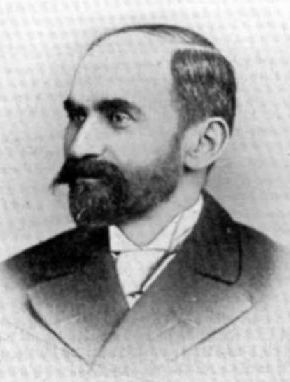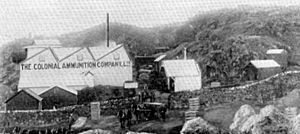John Whitney (industrialist) facts for kids
Quick facts for kids
John Whitney
|
|
|---|---|

Portrait of John Whitney
|
|
| Born | 27 June 1836 Shrewsbury, Shropshire, England
|
| Died | 6 September 1932 Auckland, New Zealand
|
| Occupation | Industrialist Soldier |
John Whitney (born 27 June 1836 – died 6 September 1932) was an important businessman in New Zealand. He started a big factory called the Colonial Ammunition Company. This company made bullets and other supplies for soldiers. John Whitney was born in England. He was a soldier in the British Army for many years, mostly in Ireland. In 1884, he and his family moved to New Zealand.
A big event in 1885, called the Panjdeh incident, made him join the local army in New Zealand. During this time, Britain stopped sending ammunition to New Zealand. To help with this problem, Whitney decided to start his own company to make ammunition. By 1888, his company grew into the Colonial Ammunition Company. They built factories in Mount Eden in Auckland, New Zealand, and in Melbourne, Australia. These factories made ammunition for both the New Zealand and Australian governments. The company was very important during the First World War, supplying many bullets. After John Whitney retired, his son took over the business. Whitney passed away in Auckland, New Zealand, when he was 96 years old.
Contents
Early Life and Army Days
John Whitney was born on 27 June 1836 in Shrewsbury, England. His parents were James and Sophia Whitney. He went to school in Shrewsbury. After finishing school, he joined the British Army in 1858. He became an officer in a group called the 10th (North Lincoln) Regiment of Foot. He mostly served in Ireland.
Two years after joining the army, he married Harriet Musters in Colwick, England. They had six children together. When his father died, John Whitney inherited the family's land at Calver Hill.
Moving to New Zealand
In 1884, John Whitney sold his family's land. He then moved with his family to New Zealand. They arrived in Auckland at the end of that year on a ship called the Waihora. The next year, a big problem happened called the Panjdeh incident. This event caused a lot of tension between the British Empire and Russia.
Because of this tension, John Whitney joined the New Zealand militia. This was a local army made up of citizens. He started as a captain and led a group of soldiers at Fort Resolution in Auckland. Later, he became an aide-de-camp to the main commander of the New Zealand militia, Major General George Whitmore.
Starting an Ammunition Factory
The Panjdeh incident had another big effect: Britain stopped sending ammunition to New Zealand. Britain needed to save its own bullets for its soldiers. This meant New Zealand did not have enough ammunition. John Whitney saw this problem and decided to do something about it.
Whitney first tried to make ammunition with a gunsmith named W. H. Hazard in Auckland. But this first try did not work well because they didn't have enough experience. Hazard left the partnership, and Whitney was left with a lot of debt. But Whitney did not give up. He started his own private company called Whitney and Sons. Its goal was to make ammunition.
He arranged for the machines needed to make bullets to be built locally. He then hired 25 people and started making ammunition at a factory in Mount Eden. At first, many of his workers were children. But in 1891, a new law stopped factories from using child labor. After that, most of his workers were women.
Within a year, Whitney was able to supply ammunition to the New Zealand government. He made Snider ball cartridges. People were worried about how good the bullets were at first. But there was a high demand for them. Within two years, his factory had made two million bullets.
He made his factory in Mount Eden bigger and bought more modern machines from Britain. In 1888, he changed his private company into a limited liability company. He named it the Colonial Ammunition Company Limited (CAC). This was the first company in New Zealand to make defense products. Soon, he got more contracts to make ammunition in Australia. In 1890, he started a sister company there. This new factory was in Footscray, near Melbourne.
The Colonial Ammunition Company made bullets for the armies of New Zealand and Australia. By 1897, the CAC was making one million bullets each year for the New Zealand military. But the company also made ammunition for sports and hunting. By 1900, Whitney's company was known for making high-quality products in this area too.
John Whitney also worked on new ideas for bullets. He is known for inventing a sharp-pointed .303 bullet. This new bullet could fly straighter than older types. During the First World War, the CAC made millions of .303 bullets. These were used by soldiers from New Zealand (New Zealand Expeditionary Force) and Australia (Australian Imperial Force). Whitney's company had over 2,000 workers. It was the only ammunition factory in the Southern Hemisphere (the bottom half of the world). It played a very important part in the economies of both New Zealand and Australia.
After the war, the Australian government rented the CAC's factory in Melbourne. Later, in 1927, they bought it. By this time, Whitney had changed how his New Zealand business was run, making it a private company again. When he retired, one of his sons took over the CAC. Two of his grandsons also held important jobs in the company.
Later Life and Family
After he retired, John Whitney lived in a family home called Wenderholm. This home was in Waiwera, north of Auckland. He even paid for a church to be built there. His wife, Harriet, passed away at Wenderholm in February 1917. After her death, he sold the property.
His last years were spent living in Remuera, a suburb of Auckland. He died at his home there on 6 September 1932. Four of his children were still alive when he passed away. He is buried in Clevedon cemetery. His wife is also buried there, along with a son who died before them in 1891.
Images for kids
 | Emma Amos |
 | Edward Mitchell Bannister |
 | Larry D. Alexander |
 | Ernie Barnes |



